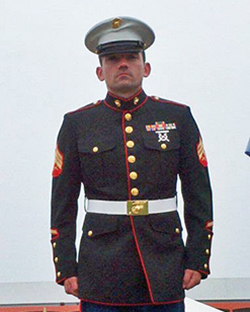
In 2004, almost three years removed from America’s 9/11 tragedy and one year following the invasion of Iraq, the United States military was at the forefront of everyday life. It was then that Joseph Massi made a decision based on results from personal research. He was going to join the United States Marine Corps. “I said, ‘I could do that. I could be a part of that. I could serve a purpose,’” he recounts.
Massi said he knew that if he were to enlist in the military, he wanted it to be the best branch for him. He wanted to be trained with the intent of being prepared if something were to happen. “That’s what motivated me. Now realistically, some people say (they join) for a love of country, or a heritage thing like a father or mother served. For me, it was that I needed a purpose. I needed a job. I needed a way to give myself a path.”
So Massi entered Marine boot camp in 2005, first as a reservist, then took opportunities for active duty, and ultimately rose to station commander in the marine recruiting office at Cape Cod, one of only two sergeants on the eastern seaboard at the time. He did stints at Fort Devens (Mass.), Alaska and California before deploying to Iraq, and totaled just over eight years in service before medical issues forced him into an early military retirement. “My plan had been to stay (in the Marine Corps), but silver lining, now I’m here,” he said.
Here is a part of Professor Pradeep Guduru’s lab, where he was recently awarded a Carl Nielsen ’56 Summer Research Fellowship for the work he is doing to develop multifunctional structural batteries and supercapacitors that integrate energy storage capability in load-bearing structures.
After military retirement, it took six more years and a stellar academic record at Bristol Community College, along with an interaction with Mike Muir and Kim Millette from the Office of Military-Affiliated Students, to pave a way for Massi’s arrival on College Hill. “Mike and Kim came to BCC to give a talk. As I was leaving, Mike caught up to me and asked if I was a Marine. He said he was too, and basically just said, ‘keep an open mind and think about the doors that could open for you, if you did this.’ I went home and started thinking about it, and realized the path at Brown for engineers in renewable energy was so much better than what I had been thinking.
“Transferring from a community college where you are relatively known, to a four-year university where you are just another face in the crowd, especially among the caliber of students here, during COVID when you can’t just go knock on doors and talk to people, meant I had to make my own version of that,” Massi said. “I looked at all the advisors in engineering and peppered out emails to every single one of them saying ‘this is who I am, this is why I’m here, can you help me? Can I rely on you for academic or extracurricular advice?’ And more than half replied to me rather quickly. I mean, I was expecting maybe one or two emails back, but most of them replied. And Professor Guduru was one of those. He said he wasn’t really in an advising position right now, but he was here if I needed him. I said I do because you’re in the realm of mechanics of materials, but I don’t want to waste your time. He responded ‘If you are interested, I have a research opportunity.’” Massi said he was interested. Once Guduru explained the topic, he knew he’d made the correct choice.
Guduru’s lab was recently awarded a large grant from the Office of Naval Research to investigate the mechanics of battery and supercapacitor materials - could the structure of a material itself be designed to have electrochemical energy storage capability to realize lighter and more efficient multifunctional materials?
“At this point, I’m trying to be mixed up in everything Professor Guduru touches,” Massi said. “He believes in this and his belief and optimism breed a lot of confidence in what I’m doing. We are at the very beginning of this. If everything goes according to plan, we will show a proof of concept well within the timeline of this project.” With only one year until his undergraduate requirements are completed for his mechanical engineering degree, Massi will have some decisions to make.
“The energy storage component of what we’re doing ties into my pursuit of renewable energy efforts. I had painted a broad stroke, with renewable and sustainable energy as what I wanted to be part of, and over the last couple of years, I’ve been slowly narrowing it down to find where I can be most impactful in the field. I think everybody has a degree of genius in a certain area, and I’m still trying to find mine. I’m learning the fundamentals here at Brown. The research is advanced, and I plan to stay a part of this.
“I would say I have not closed any doors. Maybe I’ll go into industry, but then I think, can I do more? Can I make a bigger impact? Can I be more useful? And the answer is yes every time. I think we can always do a little bit more. I want to see what opportunities present themselves in the next year, and then I’ll make a judgement on how to balance my career path and family.”